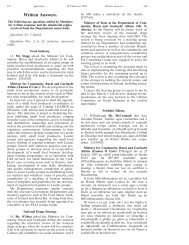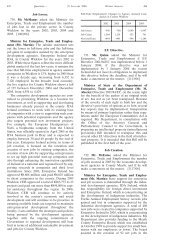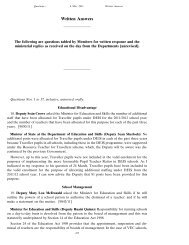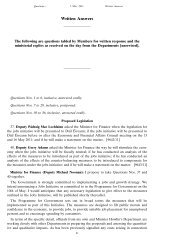Written Answers. - Parliamentary Debates - Houses of the Oireachtas
Written Answers. - Parliamentary Debates - Houses of the Oireachtas
Written Answers. - Parliamentary Debates - Houses of the Oireachtas
Create successful ePaper yourself
Turn your PDF publications into a flip-book with our unique Google optimized e-Paper software.
Questions— 14 February 2012. <strong>Written</strong> <strong>Answers</strong><br />
to ensure self-employed persons have access to jobseeker’s benefit and allowance; and if she<br />
will make a statement on <strong>the</strong> matter. [7592/12]<br />
Minister for Social Protection (Deputy Joan Burton): Self-employed persons are liable for<br />
PRSI at <strong>the</strong> Class S rate <strong>of</strong> 4% which entitles <strong>the</strong>m to access long-term benefits such as State<br />
pension (contributory) and widow’s, widower’s or surviving civil partner’s pension<br />
(contributory). Ordinary employees who have access to <strong>the</strong> full range <strong>of</strong> social insurance<br />
benefits pay Class A PRSI at <strong>the</strong> rate <strong>of</strong> 4%. In addition, <strong>the</strong>ir employers make a PRSI contribution<br />
<strong>of</strong> 10.75% in respect <strong>of</strong> <strong>the</strong>ir employees, resulting in <strong>the</strong> payment <strong>of</strong> a combined 14.75%<br />
rate per employee under full-rate PRSI Class A. (For employees earning less than €356 per<br />
week, <strong>the</strong> rate <strong>of</strong> employer’s PRSI is 4.25%).<br />
Any changes to <strong>the</strong> PRSI system to extend <strong>the</strong> full range <strong>of</strong> social insurance benefits, including<br />
jobseeker’s benefit, to self-employed persons would have significant financial implications<br />
and would have to be considered in <strong>the</strong> context <strong>of</strong> a much more significant rise in <strong>the</strong> rate <strong>of</strong><br />
contribution payable. I established <strong>the</strong> Advisory Group on Tax and Social Welfare last year to<br />
meet <strong>the</strong> commitment made in <strong>the</strong> Programme for Government. The Advisory Group will,<br />
inter alia, examine and report on issues involved in providing social insurance cover for selfemployed<br />
persons in order to establish whe<strong>the</strong>r or not such cover is technically feasible and<br />
financially sustainable. In addition, <strong>the</strong> Actuarial Review <strong>of</strong> <strong>the</strong> Social Insurance Fund, which<br />
is due to be completed in mid-2012, will examine this matter.<br />
Self-employed workers may establish eligibility to assistance-based payments such as jobseeker’s<br />
allowance. They can apply for <strong>the</strong> means-tested jobseeker’s allowance if <strong>the</strong>ir business<br />
ceases or if <strong>the</strong>y are on low income as a result <strong>of</strong> a downturn in demand for <strong>the</strong>ir services. In<br />
general, <strong>the</strong>ir means will take account <strong>of</strong> <strong>the</strong> level <strong>of</strong> earnings in <strong>the</strong> last twelve months in<br />
determining <strong>the</strong>ir expected income for <strong>the</strong> following year and, in <strong>the</strong> current climate, account<br />
is taken <strong>of</strong> <strong>the</strong> downward trend in <strong>the</strong> economy. As in <strong>the</strong> case <strong>of</strong> a non-self-employed unemployed<br />
claimant <strong>of</strong> jobseeker’s allowance, <strong>the</strong> means <strong>of</strong> husband/wife, civil partner or cohabitant<br />
will be taken into account in deciding on entitlement to a payment.<br />
Social Insurance<br />
302. Deputy John Lyons asked <strong>the</strong> Minister for Social Protection with regard to overcharging<br />
under <strong>the</strong> health levy element <strong>of</strong> PRSI, her views on <strong>the</strong> timing <strong>of</strong> <strong>the</strong> announcement which<br />
has meant that many <strong>of</strong> those overcharged in 2008 and previous years, missed <strong>the</strong> deadline <strong>of</strong><br />
31 December to claim a refund. [7629/12]<br />
Minister for Social Protection (Deputy Joan Burton): The Department has received a very<br />
high level <strong>of</strong> enquiries in relation to requests for refunds <strong>of</strong> <strong>the</strong> Health Contribution over <strong>the</strong><br />
last few weeks and I am pleased to be able to take this opportunity to clarify <strong>the</strong> position in<br />
relation to this matter.<br />
Since <strong>the</strong> introduction <strong>of</strong> <strong>the</strong> health contribution <strong>the</strong> Department <strong>of</strong> Social Protection has<br />
refunded <strong>the</strong> contribution where it was found that <strong>the</strong> conditions for refund were met. Prior to<br />
2010 <strong>the</strong>re was no time limit on <strong>the</strong> period for which refunds were paid and any requests for<br />
refunds submitted prior to 1 January 2010 were processed on that basis.<br />
To clarify <strong>the</strong> position in relation to eligibility for a refund a person who earned more than<br />
€26,000 in 2008, 2009 and 2010 was liable to pay <strong>the</strong> Health Contribution and is not due<br />
a refund.<br />
A person who earned less than €26,000 and never earned more than €500 in any one week<br />
would not have been charged <strong>the</strong> Health Contribution and is not eligible for a refund.<br />
457











![[Deputy Michael Noonan.]](https://img.yumpu.com/30494839/1/190x245/deputy-michael-noonan.jpg?quality=85)




